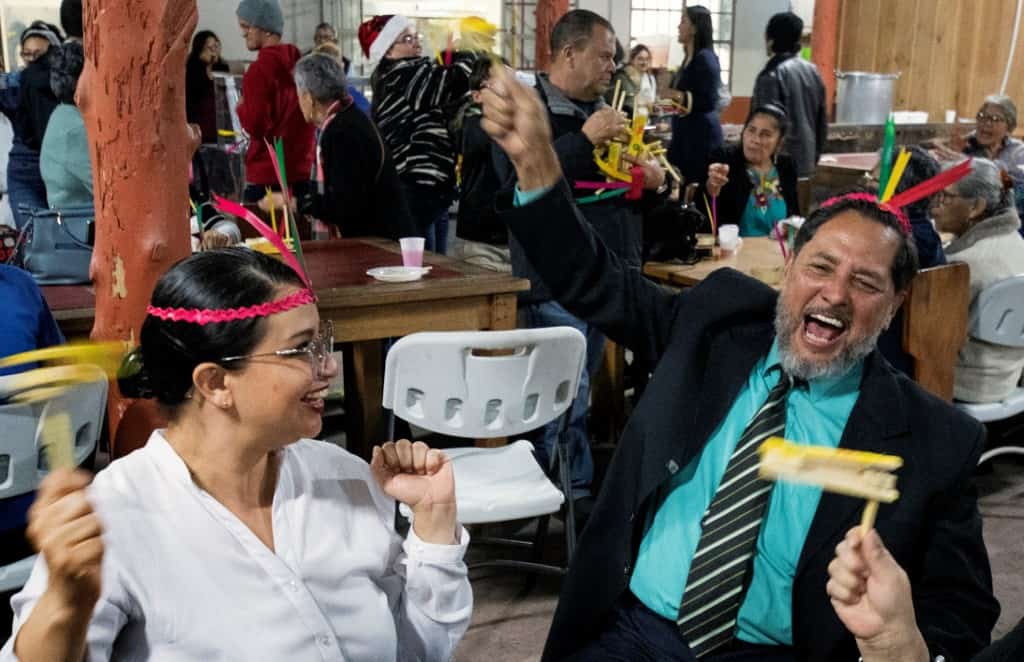At the gates of the Managua cathedral, in parishes in San José, Madrid or Miami, with altars in houses or parking lots, Nicaraguans celebrated, in Nicaragua or in exile, their biggest Catholic holiday, “La Gritería”, amidst tension between the Church and Daniel Ortega’s government.
“Who causes so much joy?”, asked the Nicaraguan cardinal Leopoldo Brenes at nightfall on Thursday, and hundreds of parishioners gathered in the atrium of the cathedral around an altar with the image of the Virgin, responded: “the Conception of Mary”.
The same cry was replicated in other churches in the country, but also in Costa Rica, Spain and the United States, where Nicaraguans who emigrated or were forced into exile are concentrated, united from afar by the religious celebration, prelude to the day of the Immaculate Conception of Mary, on December 8, a national holiday in honor of the patron saint of Nicaragua.
As part of the tradition, which dates back to the mid-19th century, the faithful tour the neighborhoods to sing in front of altars made in homes, sound rattles, light fireworks, and share dishes, drinks and typical sweets.
In Nicaragua, most Catholic celebrations were restricted this year to the interior of churches by order of the government, which has accused religious leaders of supporting the 2018 opposition protests, which it considered an attempted coup d’état.
“Perhaps we have not had processions going out into the street, but I see that people participate,” said Brenes, a conciliatory figure in the clergy and close to the agreement between the Vatican and the government that allowed the release of 12 priests in October.
Raising their voices
The relationship between the Church and the government deteriorated amid the protests, which lasted at least three months, with clashes between opponents and supporters that left more than 300 dead, according to the UN.
The government expelled, banished or prevented the entry of 151 priests and 76 nuns in the year, according to exiled opponents, who denounce a fierce persecution against the Church.
“The Church is the first institution that has maintained its resistance and raised its voice” in Nicaragua, Father Carlos Jiménez, from the San Isidro de Coronado church, in the northeast of the Costa Rican capital, where “La Gritería” was celebrated, told AFP.
The most emblematic case is that of Bishop Rolando Álvarez, sentenced in February to 26 years in prison on charges of treason against the homeland, among others, and who has preferred prison to exile. “He has chosen to stay, amid the limitations he has, as a prophetic sign to denounce the abuses,” Jiménez added.
Without overlooking the festivity, the government set up large illuminated altars on a central avenue in Managua. “La Gritería is the great feast of solidarity between Nicaraguan families,” Vice President Rosario Murillo said this week.
Ortega and Murillo, his wife, celebrated the festivity in private with their children and grandchildren, according to images from the pro-government portal El 19 Digital, which showed the family around an altar with the image of the Virgin.
Nostalgia, promises and hope
In neighboring Costa Rica, where most exiles are concentrated, “La Gritería”, also known as “La Purísima”, was also celebrated in a parking lot downtown and in popular neighborhoods such as La Carpio.
“It is a mixture of feelings (…) There is that bittersweet taste: sweet because we can do it (celebrate “La Gritería”) … and a little sour because we are not in the homeland,” said Guadalupe González, 43, who arrived in Costa Rica seven months ago.
In Miami, Nicaraguans set up altars, with flowers and lights, in the trunks of cars in some parking lots. In Managua, in the Santa Ana neighborhood, Albertina Galeano, a 70-year-old retiree, has raised hers for three decades, in the living room of her modest home.
“They are promises of favors received from the Virgin,” said the woman, who received dozens of adults and children who came to sing in front of the altar in turns. In the Managua cathedral, Cardinal Brenes said, conciliatory, hoping that the Church and the State, and Nicaraguans inside and outside their country, “we can all work for peace” and the “reconciliation” of Nicaragua.






